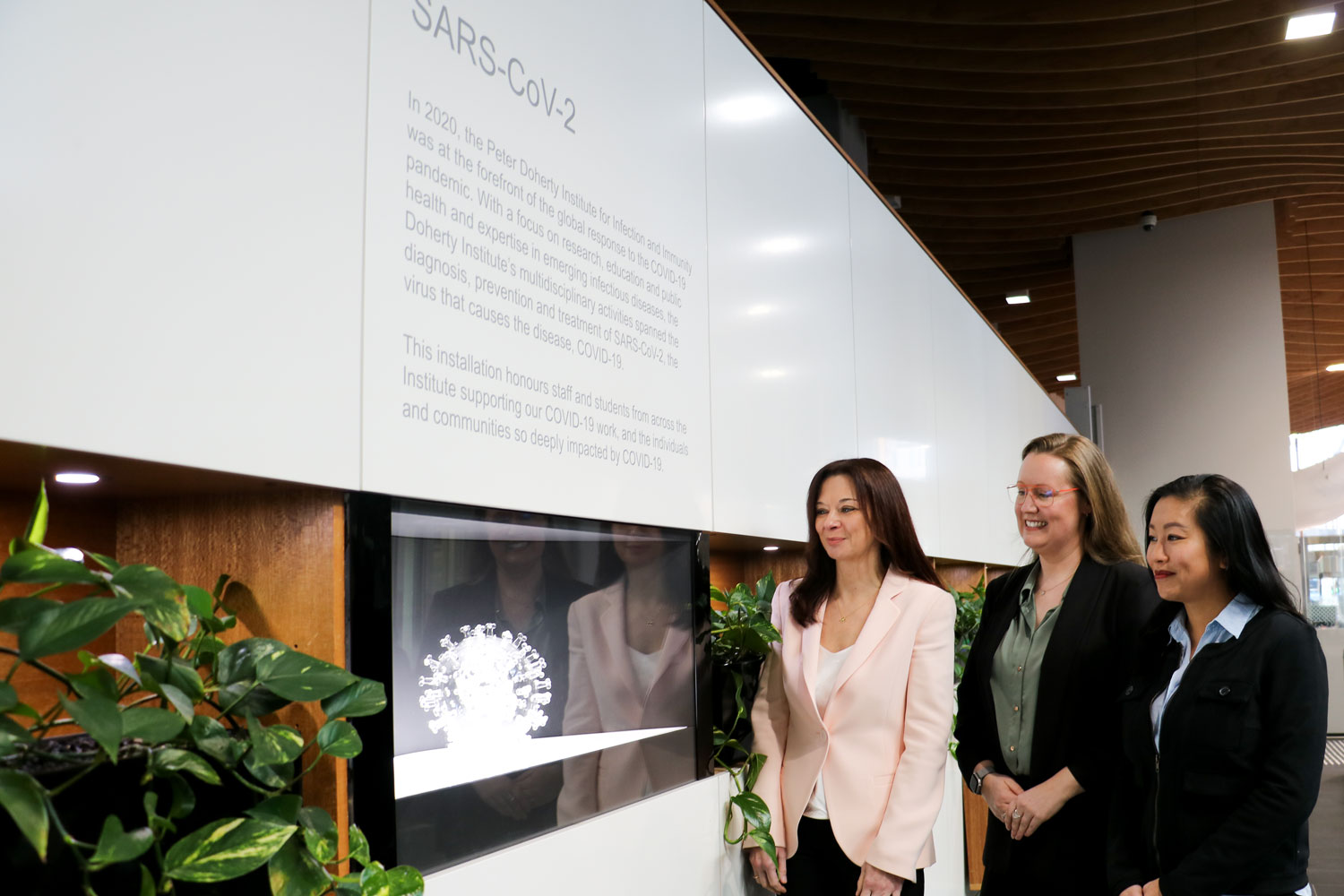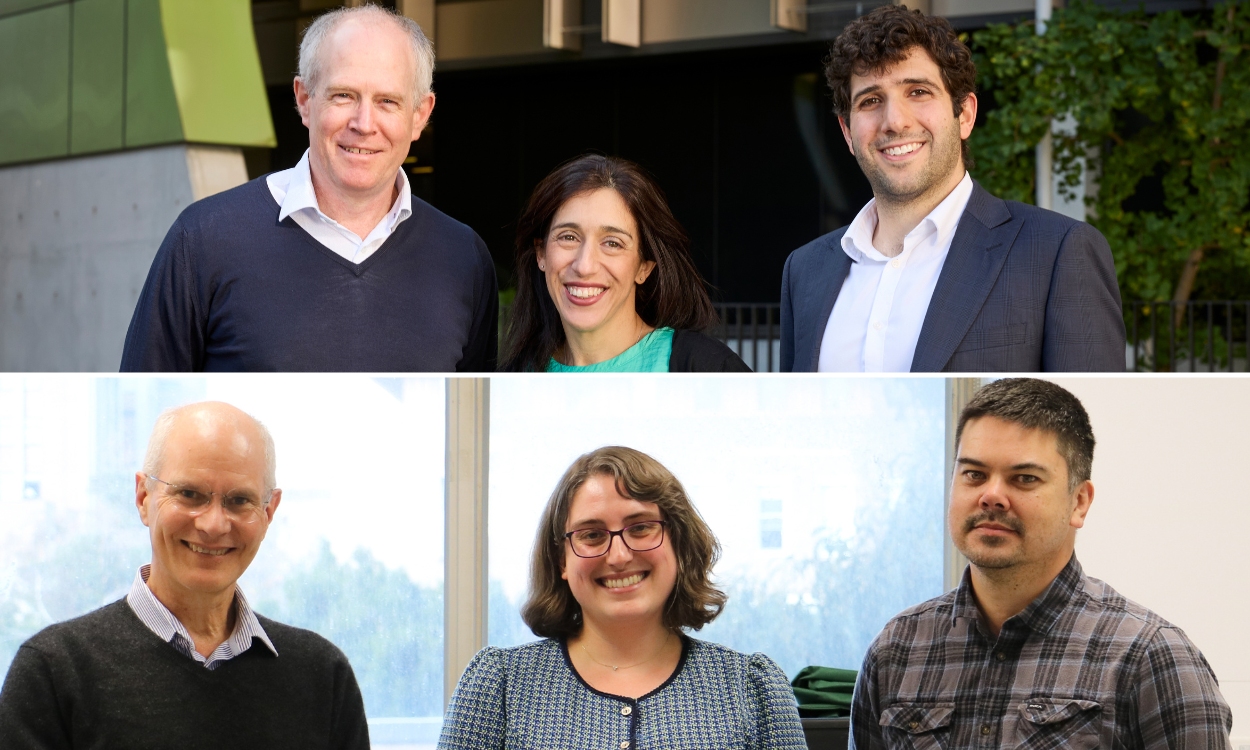19 Jul 2023
Doherty Institute researchers announced as finalists in Australia’s leading science awards, the 2023 Australian Museum Eureka Prizes
Two teams of Doherty Institute researchers have been announced as finalists for the 2023 Eureka Prizes – Australia's most high-profile science awards. Both teams are finalists in the category of Research and Innovation – Infectious Diseases Research in recognition of their outstanding work on the immunology of COVID-19.
University of Melbourne Laureate Professor Sharon Lewin, Director of the Doherty Institute, congratulated both teams and said to have not one, but two teams from the Institute as finalists was extraordinary.
“It is outstanding to see the work of both of these teams recognised in this way,” said Professor Lewin.
“Building on years of expertise in immunology and virology, both teams were able to rapidly turn their attention to SARS-CoV-2 when the COVID-19 pandemic hit, and harness their knowledge to make incredible discoveries at speed to the benefit of us all.”
The Corona Queens
University of Melbourne Professor Katherine Kedzierska, Head of the Human T cell Laboratory, together with Dr Oanh Nguyen, a Senior Research Fellow and Dr Louise Rowntree, a Postdoctoral Researcher have been selected for their research advancing the understanding of how the human immune system fights against COVID-19. Their work on immune responses in high-risk groups – including children, the elderly, pregnant women and cancer patients – accelerated global research into infection and vaccination.
“Since pre-COVID-19, as part of our influenza research program, my team has been researching immunity to viral infections and vaccinations. We want our work to help design better, more effective vaccines against infection. We believe that vaccines should induce a breadth of immune responses, including antibodies and killer T cell responses,” said Professor Kedzierska.

Professor Katherine Kedzierska, Dr Louise Rowntree and Dr Oanh Nguyen at the Doherty Institute
“Our work focusses on high-risk groups who are vulnerable to severe illness. This includes young children, the elderly, pregnant women and cancer patients. Through our research, we found that COVID-19 vaccination was very effective at generating killer T cell responses, as well as antibody responses.
“Importantly, we discovered that blood cancer patients, who are immunosuppressed and cannot generate any antibodies, generate strong T cell immunity against SARS-CoV-2 after vaccination. This finding provides key insights for future immunisation strategies with vaccines such as influenza, which predominantly induce B cell immune responses.”
Immunity to COVID
A team of researchers co-led by University of Melbourne Professor Stephen Kent, Lab Head, Infectious Diseases Physician and Virologist at the Doherty Institute, and Professor Miles Davenport, Program Head of the Infection Analytics Program at the Kirby Institute, UNSW, have been selected for their discoveries on the role of antibodies in combating COVID-19. Their insights – derived from integrating in-depth virological and immunological studies with mathematical modelling – shaped global vaccination policies and accelerated vaccine distribution. Their unique approach also offers a new method for future infectious disease research.
“Our team worked collaboratively on understanding immunity to COVID-19. We had a Eureka moment in 2021 when we found that the amount of antibody induced by a vaccine was strongly linked to how effective the vaccine was,” said Professor Kent.

Professor Miles Davenport, Associate Professor Deborah Cromer and Dr David Khoury from the Kirby Institute, and Professor Stephen Kent, Dr Jennifer Juno and Dr Adam Wheatley from the Doherty Institute
“However, we found this immunity declines over time and isn’t as good against new strains of the virus. Our findings helped guide government policy on how best to use COVID-19 vaccines both in Australia and around the world. This allowed wide distribution of the vaccines, saving many lives.”
“The COVID-19 pandemic presented an enormous challenge to the infectious diseases and immunology communities. The response was one of great cooperation, collaboration, and innovation between research groups,” said Professor Davenport.
“Our team was fortunate that our combination of experimental and mathematical skills was able to contribute to understanding immunity and vaccine effectiveness for COVID-19.”
Members of this team also include University of Melbourne immunologists Dr Jennifer Juno and Dr Adam Wheatley from the Doherty Institute, along with Kirby Institute researchers Associate Professor Deborah Cromer and Dr David Khoury.
The Australian Museum Eureka Prizes are the country’s most comprehensive national science awards, honouring excellence and raising the profile of science and science engagement in the community by celebrating outstanding achievement. For more information and a full list of 2023 Australian Museum Eureka Prizes finalists:
australian.museum/eurekaprizes
Winners will be announced at an Award Ceremony on 23 August 2023.


